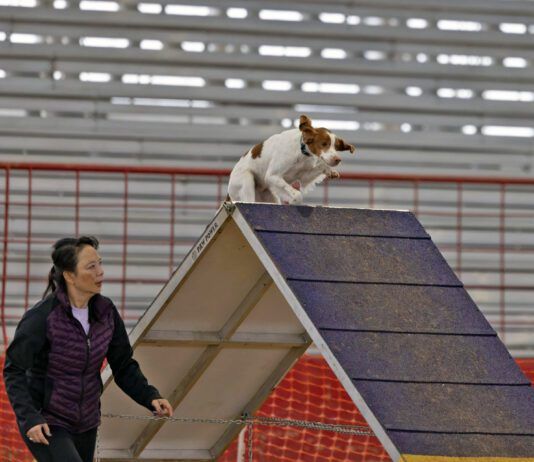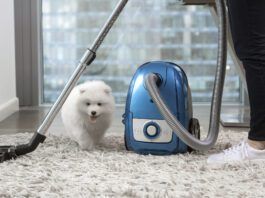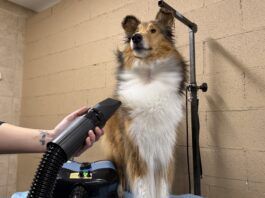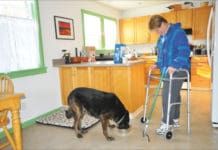Beware of Dangerous Dog Laws
Anyone who has ever been bitten (or owned a dog who has been bitten) by a dog, or owned a dog who bit someone (human or canine) – or even just had a good look into a dog’s mouth! – understands that dogs have the potential to harm others. The vast majority of dogs are not dangerous. But, because of the minority who are, there are hundreds of laws, varying state by state and community by community, that attempt to define what dangerous dogs are, and address the consequences of a “dangerous dog” designation to the dogs’ owners and the dogs themselves.
Walking in Sunshine
for example
Karen Pryor: Positive Training Icon
In 1985, upon publication of Don’t Shoot the Dog!: The New Art of Teaching and Training, written by the now-famous proponent of canine clicker training, Karen Pryor, some people were confused. Was it actually a dog training book? Because it talked an awful lot about changing the behavior of humans!
Dog Care When You’re Down
No one likes to think about having major surgery. The thought of being temporarily disabled is scary enough, but when you factor in caring for your dog or dogs by yourself afterward, the fears multiply. Don’t worry! The following tips will help you navigate your recovery with ease while taking care of your canine companions. (The tips can easily be applied to caring for other pets as well.)
Giving To Animal Charities
It’s that time of year again: making a list and checking it twice. Many of us include animal-related charities on our gift list. But how do you choose which ones to support? There is no shortage of good causes. Here are some guidelines for how to evaluate an organization as a potential recipient of your hard-earned dollars.
What a Waste!
The animal shelter where I often volunteer is less than a mile from a big box super store. Both are located in a low-income town in a low-income county – a rural area in northeastern California (i.e., not one of the parts of the state that you’ve heard about). Donations to the shelter are welcome, much-needed, and scarce. So, when the shelter gets a call, as it does occasionally, from a manager at that big-box store, saying that he has some dented cans of cat food or ripped bags of dog food or kitty litter that he’d like to donate to the shelter, an animal control officer is immediately dispatched to go pick up that donation, with gratitude. These donations tend to be small, but regular, and they definitely help the shelter feed and care for more animals than it would be able to otherwise.
No-Pull Dog Harness Product Review
Once upon a time, a harness was the last thing you wanted to use for a dog who pulled, because they were designed to make pulling comfortable. By distributing pressure evenly across the chest they removed pressure from the throat, where damage could be done to a dog's trachea sometimes even to the point of tracheal collapse. Harnesses are better for the dog from a health perspective, but from a training viewpoint, a standard harness actually encourages pulling. There's a reason sled dogs wear harnesses! Head halters were introduced in the late 1990s as a gentle control tool. While they did, indeed, work well to control a dog's head (and where the head goes, the body follows), some trainers noticed that a significant number of dogs found head halters to be fairly aversive, requiring, in many cases, extensive conditioning to convince the dog to accept them.
What’s the Best Frisbee Disc for Dogs?
I used to live with a Frisbee-addicted dog (a Border Collie named Rupert), and a disc-addicted son, who is now off at college (and still addicted). So how is it that WDJ has never before reviewed flying disc toys for dogs? There is a wide variety of flying toys made for dogs, with different key features for different applications. The overarching concept is to create a disc that flies well enough to inspire a dog to chase it, catch it, and return with it uninjured. Most of us owners want a toy that won't be ruined within three catches between a dog's teeth, but you don't want it to be so tough that it can hurt a dog's teeth or mouth if he doesn't catch it perfectly.
How to Photograph Your Dog Like A Pro!
A picture is worth a thousand words, and when it comes to our beloved canine companions, we can never have too many memories preserved in perpetuity. Like people, dogs have unique personalities. Learning to capture your dog’s attitude, spirit and charm can make the difference between a so-so photo and a memory you just have to blow up and frame. The following tips will help you take your best shot. When you want jaw-dropping photos, it never hurts to let the true professionals work their magic by scheduling a professional photo shoot for your pet.
What Sort of Pet Food “Research” Are We Talking About?
Pet food companies that are the size of Hill’s Pet Nutrition (a subsidiary of Colgate-Palmolive Company) and Iams and Eukanuba (both owned by Procter & Gamble Pet Care) can afford to conduct a variety of research and development studies, as well as conduct their own feeding trials to meet regulatory requirements for nutritional adequacy. The following are the types of studies that large pet food companies typically conduct.
How to Set Up a Pet Trust to Ensure Your Dog is Cared For...
and build alternatives into the plan in case some aspects of your ideal scenario are not feasible for your pet's caretaker.üThe single owner of two dogs with significant behavioral issues (both exceedingly shy Shar-pei)
Got a Dog-Related Legal Problem? These Animal Law Specialists Have Suggestions.
Due to his or her familiarity with the issues that are likely to arise, an attorney with experience in dog-related issues may be able to help resolve a dog-related matter in a more efficient (thus, more cost-effective) manner than an attorney without such experience.















